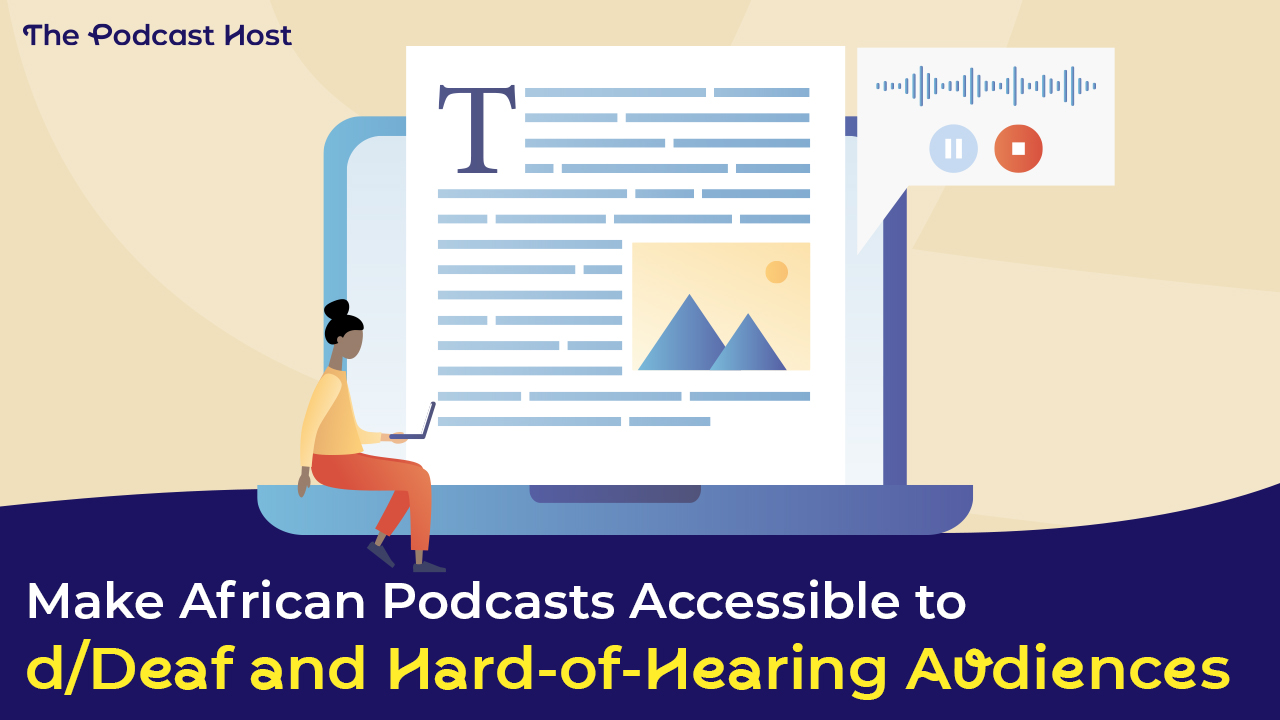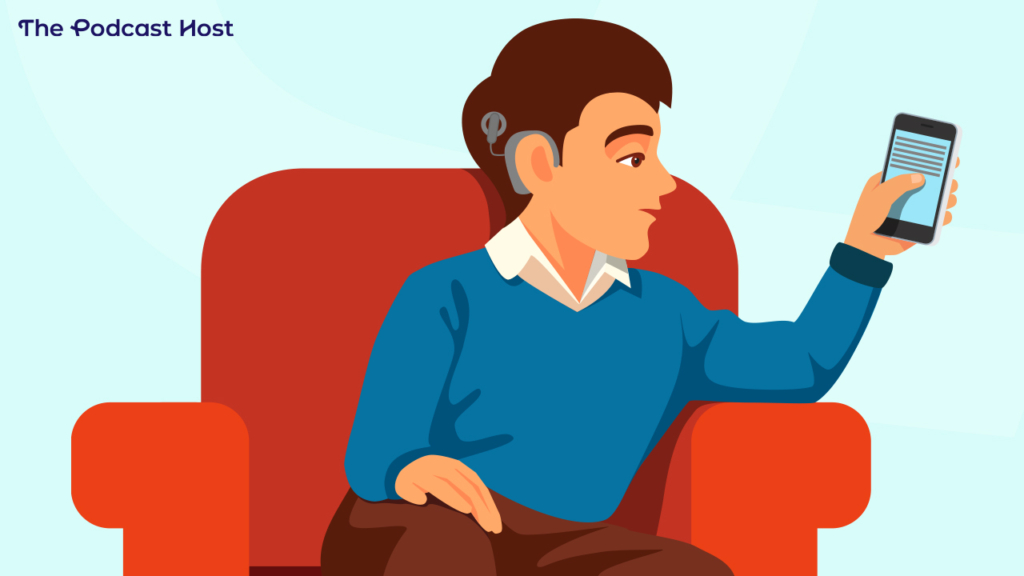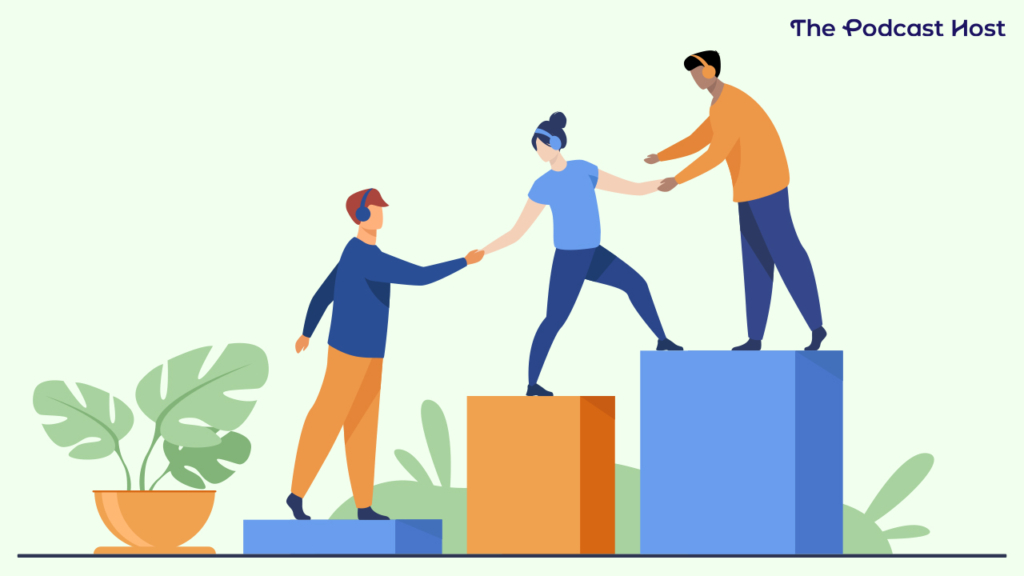Make African Podcasts Accessible to d/Deaf and Hard-of-Hearing Audiences

African podcasters need to adopt ways to make podcasts accessible to d/Deaf and hard-of-hearing audiences.
A deaf friend told me that they always see my podcast posts and would want to listen to one. This made me sad, but primarily it opened my eyes to two realities in Africa:
- The popularity of podcasting has made everyone want to share the content uniquely offered by podcasts. However, specific challenges make it difficult for the audience to access them.
- Podcasters have d/Deaf and hard-of-hearing fans out there. And they have clarified that they’d love to access podcasts too.
d/Deaf and Hard-of-Hearing Stats in Sub-Saharan Africa
WHO estimates show over 700 million people will have a hearing disability by 2050. This is 1 in every 10 people globally. In Africa alone, 332 million people expect to have a degree of hearing loss. Meanwhile, the sub-Saharan region has a high number of people who are d/Deaf and hard of hearing. It mostly affects young people between the ages of 5 and 14 years.
The region comprises South Africa, Kenya, and Nigeria, the largest African podcast markets. Further, WHO estimates that over 1 billion young people between 12–35 years are at risk of permanent hearing loss. This is because of unhealthy listening patterns fueled by recreational settings. And we can’t forget that most podcast lovers in Africa are youths. By now, I think you know where I am heading with this —taking action and innovation to make podcasts accessible to this group of audience.
As such, accessibility is a challenge that needs an urgent solution for audiences, including the d/Deaf and hard of hearing. So, this boils down to what can be done to make podcasts more accessible to them.

What Can African Podcasters Do?
Recently, many African countries have worked hard to give representation and support to differently-abled citizens. And I don’t see why the audio industry shouldn’t chime in.
Transcripts on Podcast Players
Tech gurus, media enthusiasts, and podcasters alike have the responsibility to ensure that podcasts are more accessible. VPRO Medialab is already on this path. They created TypeCast to make podcasts accessible to d/Deaf and hard-of-hearing audiences. They aimed to maintain the unique quality of audio storytelling. Although their innovation of transcripts may still need polishing, it’s still a step ahead. This podcast player has in-built transcription that can transcribe over 500,000 podcast episodes. We are just waiting for an updated version this June. Let’s see if it will allow audiences to customize it to their needs as planned.
Another podcast player that generates transcripts is Castle.
Podcast Transcripts In Swahili
In Kenya, Isakasnel Consultants, a professional podcast transcription service, transcribes podcasts into well-formatted text and compiles them in Word documents. They only specialize in Swahili and English podcast transcription but can translate transcripts into all African dialects and foreign languages. This way, podcasters can broaden their audience to dialects and languages throughout the world.
Podcast Video Can Include Captions and Sign Language
Video podcasting on Youtube helps podcasters accommodate d/Deaf audiences. Podcasters can integrate sign language interpreters into their podcasts. These can communicate conversationally with d/Deaf audiences. Additionally, captions also make a huge difference in accessibility. However, podcasters need to practice high-end diction. This is because automatic captions on Youtube are likely to misrepresent spoken content because of accents, dialects, mispronunciations, and background noise.
On that note, kudos to everyone using transcripts, captions, and websites for their podcasts. And for those who haven’t started yet, it’s about time. This also works to your advantage. Transcripts make your podcast more accessible to a wider audience, including the d/Deaf and hard of hearing. This boosts understanding of your content, engagement, and SEO.

Why Is The d/Deaf Podcast Accessibility Conversation Relevant?
So I conducted a poll on how many podcasters in the APVA community use transcripts, captions and websites to increase accessibility. Most podcasters didn’t respond to the question. But captions and websites are more popular. Podcasters use either of them separately or with transcripts. Meanwhile, a few podcasters use all of the above, and none use transcripts separately. This shows that many are yet to adopt these ways to make their podcasts more accessible.
d/Deaf and hard-of-hearing audiences should have access to podcasts. Not just in Africa but everywhere in the world. As such, podcasters, podcast executives, tech gurus, and podcasting companies must prioritize this task. This task is of great importance given that the worldwide numbers of d/Deaf and hard-of-hearing people are alarming. Those expected to be d/Deaf and of hard hearing by 2050 aren’t few either. Hence, not acknowledging this problem is costing the podcasting industry a huge loss.
Firstly, podcasters that don’t want to invest in technology that makes podcasts accessible to d/Deaf and hard-of-hearing audiences are missing out on a huge number of audience members so far. And secondly, current listeners are likely to be lost to hearing loss by 2050.
This is a time to prepare for the future by ensuring that your audience can access your podcast’s content despite their future physical condition.
I had a chat with Afripods’ CEO, Molly Jensen, on the topic. She thinks including d/Deaf audiences in podcasting spaces is essential. And while transcriptions “allow for the best current way” to include d/Deaf audiences, she is positive that advancements in technologies as Afripods expands will be able to solve issues of inclusion. While she hopes the entire podcasting can evolve to “find more ways to continue to include more people in it, especially those who may feel like they haven’t been previously.”
